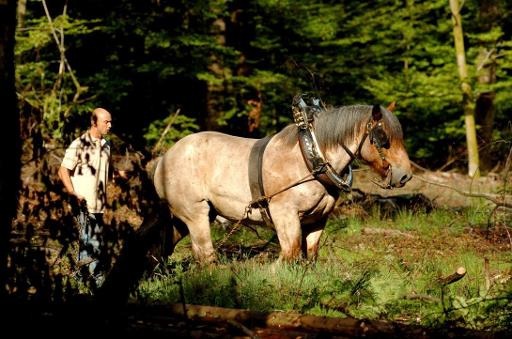The job of horse logging is disappearing in Wallonia, and with it a unique know-how. This is the warning from the European Committee of Work Horses (the “CECT”). It comes on the margins of the forest demonstrations at the Libramont Agricultural Fair being held until Wednesday at Auby-sur-Semois (Bertrix).
Although Wallonia had around 90 horse loggers about ten years ago, there are now no more than about 30 with this role as their principal activity. Moreover the occasions to get out the draught horses between rows of trees in forests are increasingly rare.
Martial Wuyts, the Director and Vice-President of CECT, laments, “We are witnessing the slow death of an occupation and of know-how which is unique to the world.”
The explanation for this occupational slow death is particularly, say the CECT, within the framework of the new general conditions adopted in Wallonia for the sale of cut timber from public forests. This enables wood merchants to circumvent the obligation to call upon draught horses for the logging of particular tree populations.
Within Walloon forests, machines therefore appear to outshine horses by a long way.
However, the horse has numerous advantages to assert in the forest. Martial Wuyts argues, “It does not pack down the soil. On the contrary, it aerates and regenerates it. The horse is very mobile. It can undertake a half-lap over a metre-square patch of ground. Moreover it is efficient and economically profitable in its niche.”
Outside of the forest, the horse wins fame in the vegetable garden, viticulture, recreational transport, green space management and public bin collections. Moreover the CECT, which was until recently called the European Committee of Logging Horses, replaced this last word by “work” to demonstrate that draught horses’ qualities go beyond logging, and may extend outside of the forest.
It is within this rationale that the traditional forest logging competition, organised as part of the forest demonstrations at the Libramont Fair, has developed “handling” tests and competitions for the maintenance of plantations, amongst other aspects. It has thus transformed into an “International Work Horse Competition.” This is an event which this year has brought together some twenty participants.
The Brussels Times

